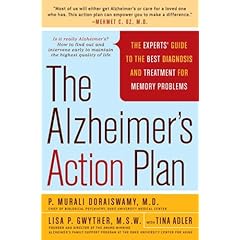“Most of us will either get Alzheimer’s or care for a loved one who has" -- Dr Oz
Editorial ReviewsReviewPraise for The Alzheimer’s Action Plan:
"Evidence-based content, conversational writing, and a good dose of humor make this an outstanding addition to collections on aging and caregiving and an excellent companion to Nancy L. Mace and Peter V. Rabins's The 36-Hour Day. Highly recommended."
--
Library Journal"Dr. Doraiswamy has done a masterful job of communicating what the layman should know on the treatment, the care giving and, most important, the prevention of Alzheimer's. It was gratifying to learn about the mountain of evidence that what is good for your heart is also good for your brain."
-
-Arthur Agatston, M.D., cardiologist and #1 New York Times bestselling author of The South Beach Diet
"Memory does matter. Adults across the life cycle are asking questions, many questions! The authors answer these questions for the educated public, family members who encounter memory loss in a loved one, and even adults who believe they are experiencing early memory loss. The answers are comprehensive and understandable, no small accomplishment given the plethora of new information available—information that at times is not only confusing but also conflicting."
--
Dan G. Blazer, M.D., Ph.D., former Dean of Medical Education, Duke University School of Medicine; past President of the American Geriatrics Society
"If you and your family face the specter of Alzheimer's disease, run - don't walk - to get Lisa Gwyther's help. She combines many years of experience with empathy and respect for the patient. That results in the most sensible, compassionate, and practical advice….She is my hero."
--
Naomi S. Boak, Executive Producer, Emmy Award-winning PBS special, "The Forgetting: A Portrait of Alzheimer's"
"This book is the most comprehensive and up-to-date guide for the diagnosis and management of Alzheimer's disease. Whether you are a health care professional or have Alzheimer's in your family or are simply interested to living to an old age, this book is a must read."
--Deepak Chopra, M.D., New York Times bestselling author of Perfect Health: The Complete Mind/Body Guide
"I love this book! A powerful and vital resource for people who need it the most. Dr. Doraiswamy is that unique blend of medical expertise mixed in with warmth and compassion topped off with humility that makes him rare and wonderful."
--
Leeza Gibbons, Emmy award-winning TV host and founder of Leeza's Place and the Memory Foundation
"Lisa Gwyther is a national treasure. She has been a pioneer in providing innovative care and education for Alzheimer’s patients and their families for many years. Lisa’s long experience helping families cope with the challenges of memory loss and Alzheimer’s disease makes her uniquely qualified to co-author this book. Families experiencing the new world of memory loss and Alzheimer’s couldn’t ask for a better companion for the journey. Her warmth, compassion, and wisdom shine through, and will help light the way."
--
Pat Lynch, Director of Communications, Alzheimer’s Center Program, National Institute on Aging
"The Alzheimer’s Action Plan provides a clear and compelling message that there is something we can all do about Alzheimer’s disease. The book presents accurate, up-to-date information and step-by-step recommendations that people with the disease, their families, and friends can use now to reduce the potentially devastating effects of Alzheimer’s disease."
--
Katie Maslow, M.S.W., Associate Director of Quality Care Advocacy for the Alzheimer’s Association and winner of the 2003 ASA Award from the American Society on Aging
"Most of us will either get Alzheimer's or care for a loved one who has. This action plan can empower you to make a difference."
--
Mehmet C. Oz, M.D., co-author of the #1 New York Times bestseller, You: The Owner’s Manual
"A readable, informative, and thorough guide to the early stages of Alzheimer’s disease. I highly recommend it."
--
Peter Rabins, M.D., co-author of The 36-Hour Day: A Family Guide to Caring For Persons with Alzheimer Disease, Related Dementing Illnesses, and Memory Loss in Later Life
"Dr. Murali Doraiswamy, one of America's top memory and Alzheimer’s specialists, has packed this book with expert advice and compassionate wisdom, creating an indispensable guide for anyone concerned about their own memory or that of a loved one. Both accessible and comprehensive, this is a must-read not just for families, but for their doctors as well."
--
Gary Small, M.D., Director, UCLA Center on Aging, and author of The Memory Bible and The Longevity Bible
"The authors speak authoritatively, providing sound evidence for the points they make that is based on current understanding of Alzheimer’s disease, but the language they use and the tone of the book will make their advice and guidelines for Alzheimer’s care and treatment readily accessible to the public….Bravo on a job so well done!"
--
John Q. Trojanowski, M.D., Ph.D., William Maul Measey-Truman G. Schnabel, Jr., M.D. Professor of Geriatric Medicine and Gerontology, Center Co-Director and Director, Institute on Aging, University of Pennsylvania Medical Center
Product Description
Is it really Alzheimer’s? How to find out and intervene early to maintain the highest quality of life
“Most of us will either get Alzheimer’s or care for a loved one who has. This action plan can empower you to make a difference.”---Mehmet C. Oz, M.D.
What would you do if your mother was having memory problems?
Five million Americans have Alzheimer’s disease, with a new diagnosis being made every seventy-two seconds. Millions more are worried or at risk due to mild memory loss or family history. Although experts agree that early diagnosis and treatment are essential, many people with memory loss and their families---and even their doctors---don’t know where to turn for authoritative, state-of-the-art advice and answers to all of their questions.
Now, combining the insights of a world-class physician and an award-winning social worker, this groundbreaking book tells you everything you need to know, including:
· The best tests to determine if this is---or is not---Alzheimer’s disease
· The most (and least) effective medical treatments
· Coping with behavioral and emotional changes through the early and middle stages
· Gaining access to the latest clinical trials
· Understanding the future of Alzheimer’s
Clear, compassionate, and empowering, The Alzheimer’s Action Plan is the first book that anyone dealing with mild memory loss or early Alzheimer’s must-read in order to preserve the highest possible quality of life for as long as possible.
Bob DeMarco is the Founder of the Alzheimer's Reading Room and an Alzheimer's caregiver. Bob has written more than 1,880 articles with more than 95,100 links on the Internet. Bob resides in Delray Beach, FL.
Original content Bob DeMarco, the Alzheimer's Reading Room










